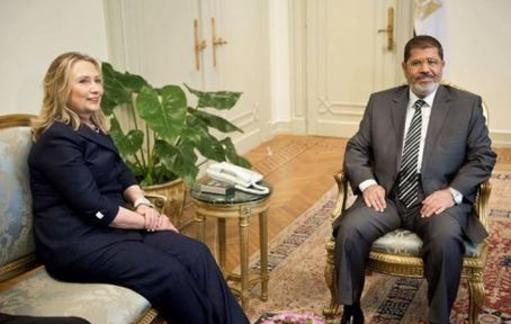
Month: January 2013
US Foreign Policy, Egypt and the Muslim Brotherhood

The Obama administration, though they would not characterize it as such nor have much desire to acknowledge it at all, have attempted a strategic detente with the “moderate” elements of political Islam.
This policy has not been entirely consistent; Syria, for example, is a quagmire the administration has wisely refrained from wading directly into despite the best efforts of R2P advocates to drag us there. But more importantly, under President Obama the US supported the broad-based Arab Spring popular revolt against US ally, dictator Hosni Mubarak, and pushed the subsequent ascendancy of the Muslim Brotherhood in Egypt and the Libyan revolution against the entirely mad Colonel Gaddafi. These appear to be geopolitical “moves” upon which the Obama administration hopes to build.
2nd amendment penumbras
The US is ill served by having the gun lobby be the primary defender of the Constitution’s 2nd amendment. The first part of the text is, as the gun controllers correctly note, under analyzed:
A well regulated Militia, being necessary to the security of a free State, the right of the people to keep and bear Arms, shall not be infringed.
The problem is that the gun controllers don’t seriously analyze it either. What is the militia is a question that has yet to be definitively answered. As clear from the statements of the Founders, the text of federal law, the collective wordings of the state constitutions and state laws, the militia is the whole of the people. Membership in the militia is pretty clear. But that doesn’t answer more than who is in the militia. It says nothing about what it is.
What does the militia do? It must do either exactly what the military does or some subset of what the military does. How do you describe what the military does? Well the military has a listing of job descriptions called Military Occupation Specialty Code (MOSC). You never hear either side of the gun control debate discuss which MOSC are covered under the penumbra of the 2nd amendment’s recognition that the security of a free state makes a well regulated militia necessary. The gun controllers get the vapors at the idea that the 2nd amendment even has penumbras while gun groups aren’t much interested in potential penumbras beyond the right to ammunition for those guns they want and other ancillary questions strictly related to the subject of pushing lead downrange.
I would suggest that seriously thinking about what a militia is and what it should be restricted from doing would leave a large body of activities that should be protected by the 2nd amendment but generally aren’t because of the outsized emphasis on the trigger puller protection portion of the text. What are the military missions that are appropriate for the US military that are inappropriate for the militia? That’s a reasonable question. Let’s start with a decidedly non-scary MOSC, quartermaster. The military will occasionally feed the hungry. Does the militia have that right? That seems fairly trivial but yes, they should be able to. But when cities try to stop the feeding of homeless in city parks, is it still trivial?
When you live in a land of very limited laws, such questions do not arise. Of course you can feed the hungry and nobody need think too hard under what bit of the Bill of Rights is usurpation prevented. We exited that territory a few new deals ago. It’s time to start going over the text without skipping parts.
RERUN–Jousting with a Phantom
(I originally posted this in July of last year. I thought it might be appropriate for a rerun given that so many otherwise-intelligent commentators are currently falling for the idea that the Obamaites truly and naively believe in “equality of outcomes.” In reality they believe in no such thing, but are conducting horizontal class warfare with the intent of collapsing the multiple ladders of success that have traditionally existed in American society into a single ladder, with access tightly controlled by people like themselves.)
Those people who call themselves “progressives” are talking a lot about equality and inequality these days. And conservatives/libertarians, in response, attempt to explain why “equality of outcomes” is infeasible and unwise.
To a substantial degree, though, they/we are jousting with a phantom. Because leading “progressives” don’treally believe in anything resembling equality—indeed, quite the contrary.
Consider, for example: Many people in “progressive” leadership positions are graduates of the Harvard Law School. Do you think these people want to see a society in which the career, status, and income prospects for an HLS grad are no better than those for a graduate of a lesser-known, lower-status (but still very good) law school? C’mon.
Quite a few “progressive” leaders are members of prominent families. Do you think Teddy Kennedy would have liked to see an environment in which he and certain other members of his family would have had to answer for their actions in the criminal courts in the same way that ordinary individuals would, without benefit from connections, media influence, and expensive lawyers?
The prevalence of “progressivism” among tenured professors is quite high. How many of these professors would be eager to agree to employment conditions in which their job security and employee benefits were no better than those enjoyed by average Americans? How many of them would take a salary cut in order to provide higher incomes for the poorly-paid adjunct professors at their universities? How many would like to see PhD requirements eliminated so that a wider pool of talented and knowledgeable individuals can participate in university teaching?
There are a lot of “progressives” among the graduates of Ivy League universities. How many of them would be in favor of legally eliminating alumni preferences and the influence of “contributions” and have their children considered for admissionor noton the same basis as everyone else’s kids? Yet an alumni preference is an intergenerational asset in the same way that a small businessman’s store or factory is.
The reality is that “progressivism” is not in any way about equality, it is rather about shifting the distribution of power and wealth in a way that benefits those with certain kinds of educational credentials and certain kinds of connections. And remember, power and connections are always transmutable into wealth. Sometimes that wealth is directly dollar-denominated, as in the millions of dollars that former president Bill Clinton was paid in speaking fees last year, or the money made by a former government official who leverages his contacts into an executive job with a “green” energy companyeven though he may have minimal knowledge of either energy or business. And sometimes the wealth takes the form of in-kind benefits, like a university president’s mansion. (Those who lived in the old Soviet Union and Eastern Europe can tell you all about in-kind benefits for nominally low-paid officials.) And, almost always, today’s “progressivism” is about the transfer of power from individuals to credentialed “experts” who will coerce or “nudge” people to do with those experts have decided would be best.
To a very substantial extent, the talk about “equality” is a smokescreen, conscious or unconscious, behind which “progressives” pursue their own economic, status, and ego agendas.
Writing in 1969, Peter Druckerwho was born in Austria and had lived in several European countrieswrote about what he saw as a key American economic advantage: the much less-dominant role played by “elite” educational institutions:
One thing it (modern society) cannot afford in education is the “elite institution” which has a monopoly on social standing, on prestige, and on the command positions in society and economy. Oxford and Cambridge are important reasons for the English brain drain. A main reason for the technology gap is the Grande Ecole such as the Ecole Polytechnique or the Ecole Normale. These elite institutions may do a magnificent job of education, but only their graduates normally get into the command positions. Only their faculties “matter.” This restricts and impoverishes the whole society…The Harvard Law School might like to be a Grande Ecole and to claim for its graduates a preferential position. But American society has never been willing to accept this claim…”¨It is almost impossible to explain to a European that the strength of American higher education lies in this absence of schools for leaders and schools for followers.
The “unwillingness of American society to accept this claim”…the claim of elite education as the primary gateway to power and wealth…has been greatly undercut since Drucker wrote. And “progressives” have been among the main under-cutters and the leading advocates for further movement in that direction.
Related: Paying higher taxes can be very profitable.
Original CB discussion thread here.
